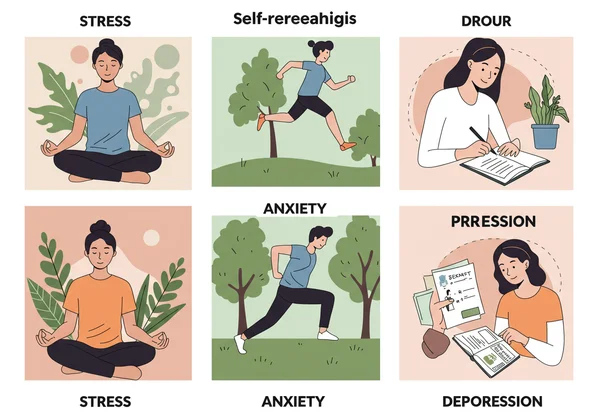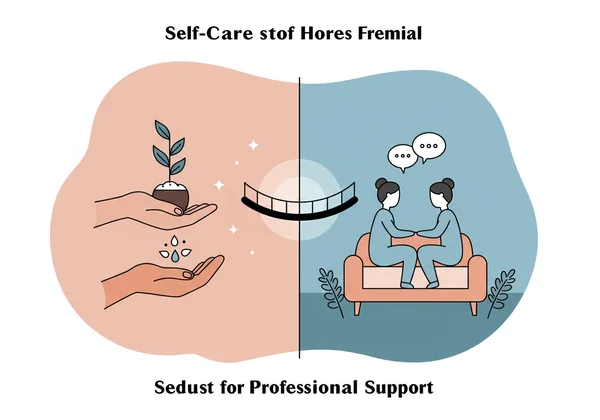DASS21 結果:實用的自我照顧與下一步行動
July 21, 2025 | By Evelyn Reed
您剛完成了憂鬱、焦慮及壓力量表(DASS21)並拿到您的分數。邁出自我了解的第一步,是自我照顧的有力行為。但您可能會看著數字問:該如何處理我的 DASS21 結果? 本指南旨在協助您從洞察走向行動。您的 DASS21 結果 不僅僅是數字,更是邁向更好心理健康的旅程起點。
本文將協助您解讀分數、探索專為您獨特情況量身打造的實用自我照顧策略,並了解何時該尋求專業協助。您的結果是一份機密的個人反思工具。如果您尚未進行評估,或想重新評估您的感受,您可以透過我們免費、保密的平台 立即取得您的分數。
理解您的 DASS21 結果:數字以外的意義
DASS21 提供您過去一週情緒狀態的快照。它不是一個可怕的標籤,而是一個有用的工具,能區分憂鬱、焦慮和壓力這些常重疊的感受。了解每個分數代表的意義,是邁向賦權的第一步。這是 DASS21 分數解讀過程中極為關鍵的一環。

解讀您的憂鬱、焦慮與壓力分數
您的 DASS21 報告提供三個獨立分數。每個分數衡量一種獨特的情緒狀態:
- 憂鬱 (Depression): 這個分數反映了如情緒低落、失去興趣或愉悅感,以及感到沒有價值感等症狀。這是關於感到沮喪、絕望,以及難以提起生活中的興致。
- 焦慮 (Anxiety): 這個分數指向生理激動、恐慌發作和恐懼。這是感到緊張不安、擔心失去控制,或經歷如心跳加速或顫抖等生理症狀。
- 壓力 (Stress): 這個分數衡量神經緊張、易怒和容易煩躁的感受。這反映了一種過度激動的狀態,難以放鬆或從中恢復。
透過區分這些經驗,您可以更清晰地了解自己真正感受到的情緒。例如,您可能會發現,您原以為是「單純的壓力」,實際上帶有焦慮的成分,而您現在可以針對性地處理這些成分。開始這趟旅程的一個好方法是 進行免費的 DASS21 測試,看看您的個人化分析結果。
DASS21 嚴重程度等級的意義 (正常至極度嚴重)
除了您的分數之外,您還會看到從「正常」到「極度嚴重」的嚴重程度等級。這些等級為您的分數提供了背景資訊,幫助您了解與一般人群相比,您的經歷有多麼強烈。
- 正常/輕度 (Normal/Mild): 您的症狀可能尚在可管理範圍內,且不太會顯著影響您的日常生活。這是專注於預防性自我照顧和建立韌性的良好時機。
- 中度 (Moderate): 您的情緒困擾可能相當顯著,並且可能正在影響您的工作、學業或人際關係。現在是積極採納應對策略的關鍵時期。
- 嚴重/極度嚴重 (Severe/Extremely Severe): 您的症狀可能已造成顯著的困擾與功能損害。在這些情況下,強烈建議您尋求心理健康專業人士的諮詢。
請記住,這些並非永久的標籤。它們是您當前狀態的指標,會隨著時間、努力和支持而改變。 我們的線上 DASS21 工具 的目標是提供這種清晰度,讓您可以採取明智的下一步行動。
專為您的 DASS21 設定量身打造的實用自我照顧策略
您的 DASS21 結果可以作為選擇最有效自我照顧方法的指南。雖然這些建議對心理健康普遍有益,但您可以專注於與您的分數最相關的領域。這些焦慮應對策略和壓力管理技巧,可以成為一個絕佳的起點。

日常正念與放鬆技巧,用於壓力管理
如果您的壓力分數偏高,您的神經系統可能處於超速運轉狀態。關鍵在於為您的一天中,刻意安排片刻的寧靜。
- 正念呼吸 (Mindful Breathing): 設定三分鐘計時器。閉上眼睛,專注於您的呼吸進出。當思緒飄走時,溫柔地將注意力導回。
- 感官覺察 (Sensory Check-in): 停下來,說出五件您能看到的事物、四件您能感覺到的事物、三件您能聽到的聲音、兩件您能聞到的氣味,以及一件您能嚐到的味道。這有助於將您拉回當下。
- 漸進式肌肉放鬆 (Progressive Muscle Relaxation): 繃緊一個肌群(例如您的拳頭)五秒鐘,然後放鬆十秒鐘,感受其中的差異。逐步放鬆您的全身肌肉。
用於焦慮應對的穩定技巧與健康習慣
焦慮常將我們拉向對未來的憂慮或「萬一」的假設情境。穩定技巧能將您帶回當下的安全感。
- 5-4-3-2-1 方法 (The 5-4-3-2-1 Method): 如前所述,這個感官覺察練習,是處理高度焦慮時刻的有效穩定方法。
- 身體活動 (Physical Movement): 焦慮會產生不安的能量。透過快走、伸展或隨著您最喜歡的歌曲跳舞,將其以建設性的方式引導。
- 限制咖啡因與酒精 (Limit Caffeine and Alcohol): 這些物質可能會引發或加劇焦慮症狀。當您感到緊張時,選擇草本茶或水。
培養韌性與情緒提升技巧,用於憂鬱自我照顧
當您的憂鬱分數較高時,動力可能會不足。專注於一些小型、可實現的行動,以建立動量並引入正面情緒。
- 行為活化 (Behavioral Activation): 選擇一項您過去喜歡的、簡單的小活動,即使您現在提不起勁(例如,聽一首歌、在街區散步)。行動本身就能改善您的情緒。
- 感恩練習 (Gratitude Practice): 每天寫下三件您具體感激的事情。這能訓練您的大腦去注意積極事物,對抗憂鬱症常有的負面偏向。
- 連結 (Connection): 聯繫一位朋友或家人,即使只是發個簡單的訊息。社會連結是緩解憂鬱常伴隨的孤立感的強大解藥。
何時尋求專業協助:自我照顧之外的下一步
自我照顧至關重要,但有時並不足夠。知道何時該尋求專業協助,是力量和自我認知的體現。DASS21 自我評估是一個寶貴的起點,但不能取代專業評估。

識別值得專家諮詢的跡象
若出現以下情況,是時候考慮與專業人士談談了:
- 您的症狀持續超過數週。
- 您的分數落在「嚴重」或「極度嚴重」的範圍。
- 您的情緒狀態顯著影響您在工作、學校或人際關係中的功能。
- 您正在使用不健康的應對機制,例如藥物濫用。
- 您有任何傷害自己或他人的想法。若有此情況,請立即聯繫危機熱線或緊急服務尋求協助。
如何與治療師或醫生討論您的 DASS21 分數
您的 DASS21 結果可以作為與醫療保健提供者展開對話的絕佳工具。它們提供了關於您經歷的客觀、結構化資訊。
- 攜帶您的結果: 向他們展示您的分數和嚴重程度等級。您可以提及您使用了我們平台上的 DASS21 自我評量。
- 解釋您的「原因」: 告訴他們是甚麼促使您進行測試。例如:「我一直感到持續的緊張和易怒,所以我做了這個評估,壓力分數很高。」
- 具體說明: 使用 DASS21 問卷中的問題作為例子。您可以說:「關於『我對未來沒有期待感』的問題,確實引起我的共鳴。」
賦予您的旅程力量:採取行動以促進心理健康
您的 DASS21 結果是羅盤,而非判決。它們提供方向,讓您能夠更清晰、更有意圖地駕馭您的內心世界。透過了解您的分數、實施量身訂製的自我照顧,並知道何時尋求支持,您正在積極掌控您的心理健康之旅。

這是一個持續與自己對話的過程。您今天感受到的情緒,可能與您下個月感受到的不同。我們鼓勵您將我們的 免費 DASS21 測試 作為常規的檢查工具,以監測您的進度並調整您的策略。您的健康之路是獨一無二的,而您有力量塑造它。
關於您的 DASS21 結果與下一步行動的常見問題
DASS21 測試是心理健康狀況的診斷工具嗎?
不,必須要了解 DASS21 是一個篩檢工具,而非診斷工具。它能可靠地評估憂鬱、焦慮和壓力症狀的嚴重程度,但無法提供臨床診斷。只有合格的醫療保健專業人士,如醫生或心理學家,在進行全面評估後才能做出正式診斷。
DASS21 量表上的「正常」分數是多少?
「正常」範圍表示症狀程度低,這在一般人群中很常見,並且通常不會干擾日常生活。正常範圍的具體分數為:憂鬱 (0-4),焦慮 (0-3),壓力 (0-7)。您可以透過進行我們的評估來 詳細了解您的分數。
DASS21 量表用於自我評估的可靠性如何?
DASS21 是一個成熟且經過科學驗證的量表,廣泛用於研究和臨床環境。它在衡量憂鬱、焦慮和壓力這些區隔分明的狀態方面,已顯示出高可靠性和效度。作為一種自我評估工具,它提供了您近期情緒體驗的可靠評估。
我應該與心理健康專業人士分享我的 DASS21 結果嗎?
絕對應該。分享您的結果是與治療師、輔導員或醫生展開有益對話的極佳方式。它能為他們提供您症狀的清晰、結構化概覽,並幫助他們更有效地提供個人化支持。將其視為 可靠的第一步 可以讓您更容易開啟對話。
如果我的 DASS21 分數落在「嚴重」或「極度嚴重」的範圍該怎麼辦?
看到這些範圍的分數可能會令人不安,但請嘗試將其視為一個明確的指標,表明是時候優先考慮您的心理健康並尋求專業協助。這並不代表您有什麼問題;這意味著您正承受著沉重的負擔,您理應獲得支持。聯繫醫生或心理健康服務單位是最重要的下一步。